#vladek spiegelman
Text
about maus, the graphic novel
i loved this book. it's absolutely raw and definitely worth a read. maus I does a great job at setting the scene and tone for the rest of the story, and maus II is written absolutely perfectly. props to art and vladek speigelman, as well as anyone else who was involved in the creation of this book.
0 notes
Note
I think there needs to be a reckoning about how so many white (passing) American secular/nonpracticing antiZionist Jews can say "Not in my name, Israel doesn't speak for us!" and then think they can speak for Israel. How so many of them can have a limited familial connection to Israel, have such a disdain for Israelis, Israeli culture and society, and Israel as a concept, and then have the gall to act like their opinions matter?
I see their attitudes be described as fear, but to me it strikes me as more than just fear. A lot of them, I suspect, have incorporated antiZionism as a fundamental part of their Jewish identity. It's not just a disagreement, they're not just saving face. Take away the Goyim and talk to them privately and they still believe what they believe, and express it in the same way. They hate Israeli Jews.
And Israel is only going to become less Ashkenazi (aka less "white") as time marches forward. The bad faith hysterical Israel bashing and condescension is only going to look more and more like Orientalism, and frankly, racism.
I think it's very possible that calling something antisemitic can't just be a catchall term when this chicken comes home to roost. I think if there aren't already, there will be distinct forms of antisemitism, some that only Diaspora Jews face and some that only Israeli Jews face. And if this is true or will end up being true, it's pretty important that we not speak over each other's experiences. To do that we have to recognize these experiences and respect them. Do some Israeli Jews disrespect the Diaspora experience? Yes, from what I've seen. Is it nearly as vitriolic and is it growing nearly as quickly as the disrespect for the Israeli experience among antiZionist American Jews? Not even close.
All this divisive language to say: sometimes when Israelis say "so and so is antisemitic!" in the context of antiZionism, they're talking about themselves, their experiences, the stakes for them, and not Americans. So maybe we should all learn to stay in our lanes sometimes.
A lot of Israeli Jews disrespect, or at least are unable to grasp, diaspora existence, particularly when it comes to Americans. I can't even count the number of times I read Israelis say "Why are you American Jews so upset about Trump? Don't you see how good he's been for Israel?" Which is the worst damn argument a person could possibly use - it feeds into both left-wing and right-wing antisemitism, while ignoring that American Jews live HERE and are at risk from Trump's fascist cult and general lawlessness. And it is bad FOR EVERYBODY to have "pro-Israel" become the position of stroke-babbling grotesque racist criminals, and also for America to be too focused on anarchic decomposition and Yugoslav-style street warfare to be able to support Israel like it traditionally has.
And because turds of a feather flush together, Netanyahu wants ALAN DERSHOWITZ to be Israel's advocate if the ICJ case proceeds. I knew Netanyahu was a senile failure undermining all the strengths he had ever built for the country and this is just the shit cherry on top of the shit sundae. Alan Dershowitz is the ultimate stereotype of a Boomer who was kind of useful in the 1980s-90s and became awful and embarrassing now, Trump is surrounded by them (i.e. Rudy Giuliani). Your grandma in Florida remembers Alan Dershowitz for writing "Chutzpah" and being tough and quick-witted, and everybody under 40 knows Dershowitz as a Trump cultist and Epstein fuckbuddy. Big "Vladek Spiegelman can only compare his artist son to Walt Disney" energy. There are surely thousands of lawyers better-suited for the role, just off the top of my head I'd prefer Eugene Kontorovich and so should anyone who is more aware of the world as it actually is than how it was in 1994.
I say all that to parallel your original point, not to contradict it. Yes, the American Jews who performatively loathe Israel are by and large just an Extremely Online phenomenon of the most college-town bubble-protected, least observant, least affiliated, and least aware of non-Ashkenazim. It is not so hard for American Ashkenazim to stay protected from antisemitism as long as they totally unplug from their Jewish identity and any public-facing aspects of it. Can't be killed in a synagogue or JCC or kosher store if you never go in, head tap.
270 notes
·
View notes
Text
The Pulitzer Prize-winning Maus tells the story of Vladek Spiegelman, a Jewish survivor of Hitler’s Europe, and his son, a cartoonist coming to terms with his father’s story. Maus approaches the unspeakable through the diminutive. Its form, the cartoon (the Nazis are cats, the Jews mice), shocks us out of any lingering sense of familiarity and succeeds in “drawing us closer to the bleak heart of the Holocaust” (The New York Times).
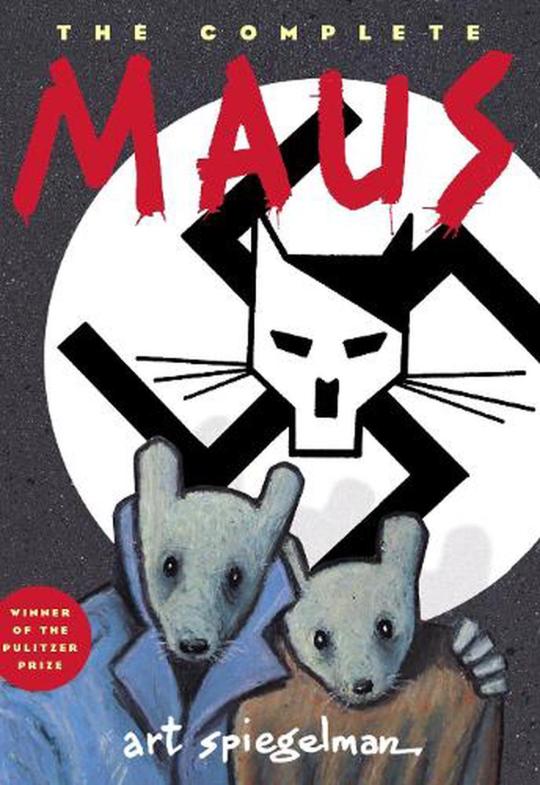

99 notes
·
View notes
Text

“Spiegelman has turned the exuberant fantasy of comics inside out by giving us the most incredible fantasy in comics’ history: something that actually occurred…. The central relationship is not that of cat and mouse, but that of Art and Vladek. Maus is terrifying not for its brutality, but for its tenderness and guilt.” —The New Yorker
#graphic novels#graphic novel#graphic memoir#graphics#comics#comix#comic artist#comic books#pantheon books#books#booklr#studyblr#banned books#art spiegelman#comic art#comic book art#illustration#libraries#maus#reading#bookish
227 notes
·
View notes
Text
The Honeymoon: Part 1
Disclaimer: I don’t own Maus or any of Spiegelman’s work. I have attached the photos from the work itself, but do not claim to own the scanned version either. I highly recommend purchasing the book to support the original author. My thoughts do not represent the author's work and are merely my own interpretations.
Warning: MAUS is a graphic novel based on the author’s father’s experiences during the holocaust and includes anecdotes and scenes including violence, blood which may be considered triggering.
Introduction: The work MAUS by Art Spiegelman is a novel that tells the story of Vladek Spiegelman and his experiences during the holocaust using an allegory and parallel storylines to depict the Vladek's past and Artie's present as he hears the story from his father. This work includes an autobiographical and biographical element due to the inclusion of two main characters - Vladek and Artie. Spiegelman makes the decision to introduce himself as a character in the work as a mouthpiece for himself.
Main Characters:
Artie: The author
Vladek: Artie's father
Anja: Artie's mother
Mala: Vladek's second wife
Françoise: Artie's wife
Navigation ->The Honeymoon Masterlist -> Previous Part

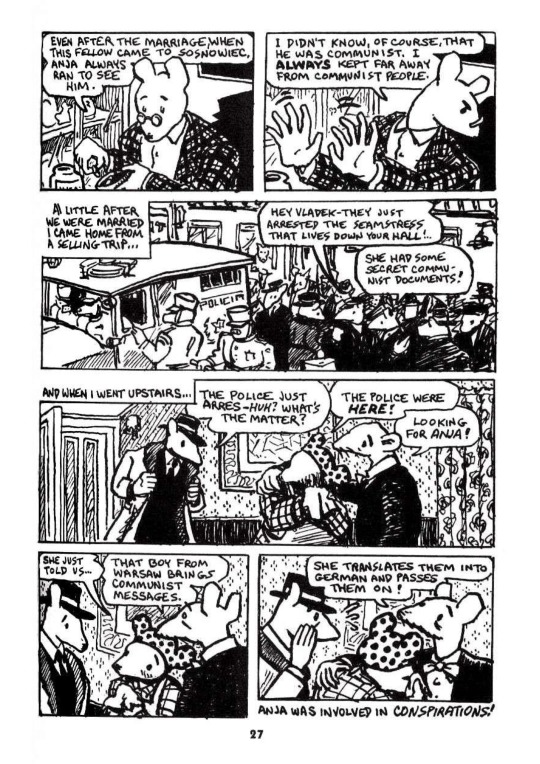
MAUS by Art Spiegelman

Points of Interest:
Health
Vladek's declining health becomes a frequent point of conversation with Artie, however the excessive consumption of pills shows the readers that there is a lot more at play to his weakness. His self study of magazines, and decision to take 25 + vitamins is self imposed. This decision seems rather foolish in the face of modern medicine, however it shows Vladek regaining a degree of control in his life. This could be a sign of overcoming his past trauma - by taking excessive precautions with his health, or was merely a an old man's stubbornness.
Anja's Story
Spiegelman's desire to discuss the story of his parents faces hiccups when considering the death of his mother. Anja had no boyfriends and no romantic relations, while Vladek had a few informal sexual relationships. This dynamic is heavily stereotypical especially since the information comes from the boy himself, and the fact that political friends were the only relations she had seems unrealistic for a woman in her 20s. Here he reiterates the lack of information about Anja, and how limited his understanding of her is.
Whispering
While living in America, Vladek still associates communists as bad, and is seen raising his hand and with italicised text presenting his disdain for them. This suggests Anja kept unsavoury connections, however limits any further knowledge and understanding about him.
Physical Distancing
However in contrast to his discussion of his own relations we see he was a pristine young man staying away from anyone with opposing political views. This is done by his moving away and shaking hands, which seem to re-emphasise our reliance on Vladek for the events of the past which makes it more concerning at the possibility of misinformation. His intention to present a more positive and acceptable view to his son and the work's reader clouds his narration and the truth.
Vladek's dependability
Upon facing any concerns Spiegelman's grandparents turn to Vladek and rely on him to face these obstacles. This is a suggestion from Spiegelman since he never met his grandparents and shows us how Vladek depicts himself addressing several problems in the family thus inflating his worthiness in a transactional relationship with his in-laws.
Conspirations
The word intended to be used must be conspiracies, and it draws the readers attention to Vladek's poor English. However the magnitude of this word is what brings the impact of breaking the law and Spiegelman's use of italics conveys the shock of the act even if Vladek fails to do so. This furthered by the emanata of shock and weariness of her parents depicts the after effects of Anja's actions.

Next Part
#maus#musings-of-a-lit-student#art spiegelman#literature#analysis#writing#long post#antisemitism#holocaust#graphic novel#comics#art#illustration#books and literature#books#book recommendations#novel#thoughts#reading#english literature#academia#dark academia#light academia#book bans#ban#banned books#education#trending#spilled thoughts
4 notes
·
View notes
Text

Book 13 of 2022!
Maus by Art Spiegelman
⭐️⭐️⭐️⭐️⭐️
This tells the story of Vladek Spiegelman, a Jewish survivor of Hitler’s Europe, and his son, a cartoonist struggling to come to terms with his fathers story.
Content Warnings: violence, war, anti-semitism, child abuse, racism, police violence and police brutality, genocide, death, suicide, mental illness
What Did I Think?
Honestly, it feels strange to talk about a book like this the way I would with any others. It was powerful and at several times throughout I had to put the book down just to gather myself together and give myself a breather. It was intensely dark, raw, real and honest. The choice to make the Nazis cats and Jewish people mice was amazing. This was by far one of the most difficult and challenging things I’ve ever read but I think everyone should. It absolutely should be required school reading.
Prompts:
Popsugar - “A Social Horror Book”
52 Book Club Challenge - “A Non-Fiction Bestseller”
#read banned books#banned books#maus#art spiegelman#comic books#graphic novels#history#germany#1940s#1930#1950s#book reviews#book review#booklr#booktok#goodreads#storygraph#popsugar#52 books#52 book club challenge 2022#popsugarreadingchallenge#52 book club challenge
8 notes
·
View notes
Photo
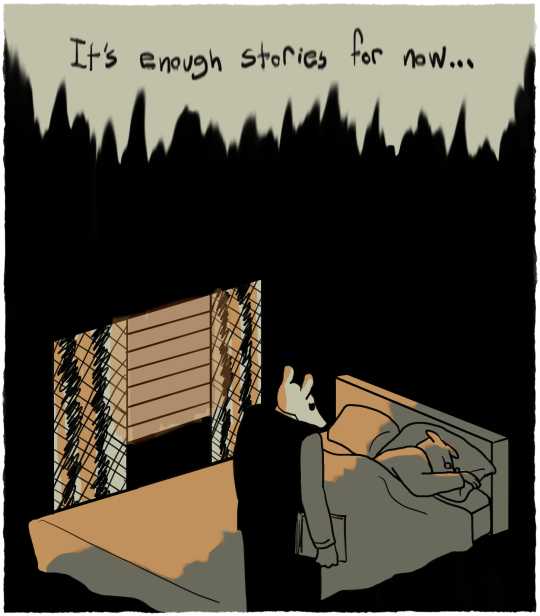
Maus (1980–1991)
The leaflet inside the most general copy of Maus calls it “the most affecting and successful narrative ever done about the Holocaust” (Wall Street Journal). While that may or may not be true, my own experience with this book is hard to put down, but I still feel the drive to, which seems par for the course for talking about this story, as Art Spiegelman’s self insert is constantly torn between whether or not to talk about the Holocaust at all, as there is so much else that he feels conflicted and troubled by that it sometimes feels pointless to just pinpoint all of his and his family and friend’s pain on this one event. Maus is a drama about how hard it is to be alive at all that is interrupted and constantly dragged down and down into bile and fire by the Holocaust, by antisemitism, and the chimes of fascism. It is not an easy story to get down, but the relationship between Art and his father Vladek, both flawed individuals who would have a hard enough time connecting even without the barrier of a mountain of dead bodies between and around them, is a genuinely touching and pushes one to the end to find out more about these people and find out how they can manage to cope and keep going despite everything.
Maus’s impact on how I see comics and stories at all is something that I can’t fully define. From a story standpoint, it rides this amazing line between intense tragedy and comedy, with parts that made me laugh loudly to myself while I read it alone in my car on my lunch breaks and with an ending that made me take a second to just bask in how subtly provocative it was with really only three panels to wrap up almost three hundred pages and over a decade years worth of art and somehow doing that in a way that felt necessary and completely effective. Every piece of art that I make now, I have Maus in the back of my head because its a piece of content that I admire so much and its something that a lot more people should be exposed to, not just to fully understand the potential of comics as a medium outside of superheroes and strips, but because it very effectively portrays the weight of a broad societal problem like antisemitism and fascism on normal people already just struggling to be alive. While this may be a bit rambley and all over the place, I just felt the need, at this moment in time, to attempt to describe how much I appreciate this piece of work and Art Spiegelman as a writer/artist and lament the place that this piece of art had to come from.
3 notes
·
View notes
Text
Speak of the Unspeakable: Memoirs of the Past
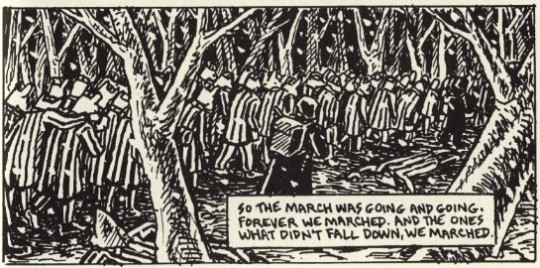
Germany’s literature legacy is an expansive one. From philosophy to fiction to verse poetry, Germans have made prolific contributions to humanity through their writing, something that has resulted in international recognition and, perhaps more importantly, a better understanding of the human condition. German literature is rich in beautifully crafted stories, especially from the eras of Sturm und Drang, Romanticism, and Realism. Certain German books are excellent introductions not only to German literature but to German culture and the history of Germany too.
In the modern post-war period, the characteristics of German literature were dominated by both subjective and political explorations of Nazism, the Holocaust, war, and political division; these themes were written about in an attempt to help heal the wounds of the 21st century. The most important aspects that have marked the development of German literature, characteristics that distinguish it and were decisive for its evolution over time, have to do with the importance that the avant-garde represents for its authors. In particular, for the modern classics, it is of great relevance in the development of literature and will give access to a series of writers who find in them access to literature.
Maus' story depicted by the narrator wanted to work with anthropomorphism in a comic book, and decided to use cats and mice as the center of this particular comic. Logically, the decision that the animals are chosen would work well to illustrate his father's experience in the period just before and during the holocaust. The narrator wants to portray a larger specter of memory than a first-person verbal narrative can achieve. Spiegelman uses the form of the comic medium to visualize the connection of the mind between the present and the past. By including both Artie and Vladek, he has achieved a narration not only depicting one side of the story, but two very different sides. As we know, Artie is not a survivor of the physical Holocaust, but he is a survivor in his own way. Both father and son have had to deal with the psychological consequences and aftermath of the Holocaust.
In Requiem for a Nun, William Faulkner writes that "The past is never dead. It’s not even the past. " (1) It points out that the past never dies because humans have a way of adapting the past to suit their present needs. (2) This happens on a personal level, as well as on a political and collective level. The graphic novel’s characteristic way of demonstrating narrative levels and time makes this story excel as not only a narration of memory but also a narration on memory.
While numerous academic studies have done extensive work on the use of the animal metaphor and the complicated relationship between father and son, few have, according to Jeanne C. Ewe "focused on Maus as a visual narrative: its graphic arrangement of narrative layers and frames, its pictorial treatment of narrative time..." (Ewert 87). The animal metaphor is an act of focalization; it plays on the assumptions of the human race as not one, but divided into several. It makes the reader contemplate the idea of a natural hierarchy between "races". While cats are the natural predators and mice are the natural prey, Germans and Jews are of the same race; the human race. However, by depicting humans as different races, the absurdity of the Nazi doctrine is highlighted. We are not presented with the past and then the future, but rather a stacking, morphing, and collision of temporalities. This is much more suitable to explain human memory.
The graphic novel medium not only allows it to challenge traditional expectations and representations of time, narration, and focalization, but the medium itself has the possibility of reaching a large readership. Most likely, this could include people that otherwise might never have picked up a Holocaust narrative. Chute argues that this is the gift of the graphic novel, its possibility to write a history that combines "formal experimentation with an appeal to mass readership" (Chute, "Comics as Literature" 459).
Irrevocably, Maus is a reflection of challenges. The power struggle in defining the past is thus not unique to Maus, but is a widespread problem in our daily lives. It is an act of prosthetic memory. Maus’ importance to collective memory is not because of Landsberg’s idea of prosthetic memory, but rather that it works to involve the reader in the difficult process of both remembering and creating memory.
3 notes
·
View notes
Text
Finished 2 March 2024:
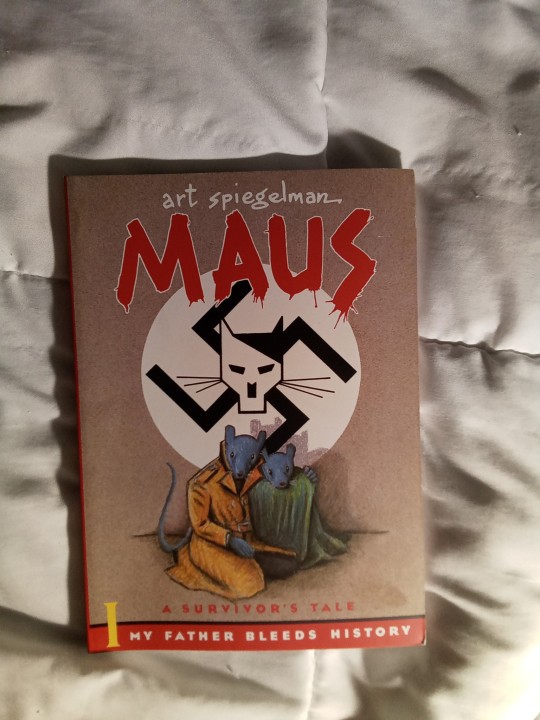
Maus - Art Spiegelman
I have had the first volume since about 2009 when I started having the money to buy the comics that I found out in college I should be reading. I finally picked up the second volume over the weekend in a rush of determination to just read it already.
There isn't a lot that a goy like me needs to say about this text, except possibly that I should have read it back in 2009, if not earlier, and that anyone reading my words on the book who hasn't read it should go read it instead. And while it is of course full of actual horrors , don't think of it as homework. It is an honor to be allowed to read this story. It was a gift from Art and Vladek and Mala that they allow us to read this story.
I wish I could sit down with Spiegelman and with Kat Chow and with others who have written this sort of family memoir and ask them--for a friend--how they write things about their family members that will potentially upset them. If it's a matter of coming to terms through the process of writing with the fact that truth is going to hurt people, or if you have to be okay with that before you start a project, or if their specific projects were so particularly important that everyone accepted that personal feelings were collateral.
0 notes
Text
Entrelazando Historia y Literatura en "Maus"
Del 27 al 1 de diciembre
En "Maus", Art Spiegelman fusiona de manera única la historia de la Segunda Guerra Mundial con elementos literarios, creando una narrativa rica y conmovedora. El testimonio personal de Vladek Spiegelman se entrelaza con documentos históricos, y la alegoría animal añade complejidad simbólica. La narrativa no lineal refleja la complejidad de la memoria, mientras que la obra reflexiona sobre la responsabilidad histórica. Este enfoque literario proporciona una comprensión más profunda y multidimensional de la historia, explorando la humanidad, la memoria y la responsabilidad de una manera única.
0 notes
Text
Maus I: A Survivor's Tale: My Father Bleeds History and Maus II: A Survivor's Tale: And Here My Troubles Began Book Review
I read the books Maus I: A Survivor's Tale: My Father Bleeds History and Maus II: A Survivor's Tale: And Here My Troubles Began by Art Spiegelman, and they were good. The first book won the Pulitzer Prize in 1992 in the category of "Special Citations and Awards." I read them because they are banned in a few schools. It's the true story of Vladek and Anja Spielgelman, Jews from Poland, who survived the Holocaust as told by his son, Art. It's told in a graphic novel format. It's interesting for multiple reasons but two in particular. First, Jews are portrayed as mice and Germans as cats. Second, the story is as much about Art's relationship to his quirky dad as it is about their survival. The story shows that survival isn't just physical, and the consequences of war extend to future generations. While powerful, Elie Wiesel's book Night is better at revealing the horrors of the Holocaust. Both these books are a recommended read.
0 notes
Text

𝐌𝐚𝐮𝐬
''Maus'' de Art Spiegelman, ha dejado una huella imborrable en el mundo de las novelas gráficas. Publicada entre 1980 y 1991, la obra ganó el Pulitzer en 1992, elevando la novela gráfica a la categoría de arte literario. Su enfoque innovador al abordar el Holocausto a través de animales antropomórficos rompió barreras y demostró la capacidad del medio para explorar temas complejos. "Maus" inspiró a generaciones de artistas y escritores, consolidando el género como un medio poderoso para narrativas profundas y emotivas. Su impacto se refleja en la creciente aceptación y respeto hacia las novelas gráficas.
¿𝐂ó𝐦𝐨 𝐬𝐞 𝐩𝐫𝐞𝐬𝐞𝐧𝐭𝐚𝐧 𝐥𝐨𝐬 𝐩𝐞𝐫𝐬𝐨𝐧𝐚𝐣𝐞𝐬 𝐞𝐧 "𝐌𝐚𝐮𝐬" 𝐲 𝐜𝐮á𝐥 𝐞𝐬 𝐬𝐮 𝐢𝐦𝐩𝐨𝐫𝐭𝐚𝐧𝐜𝐢𝐚 𝐞𝐧 𝐥𝐚 𝐧𝐚𝐫𝐫𝐚𝐭𝐢𝐯𝐚?
La presencia de los personajes en "Maus" es multifacética y simbólica. La obra utiliza animales antropomórficos para representar diferentes grupos étnicos, siendo los judíos retratados como ratones, los nazis como gatos, los polacos como cerdos, entre otros. Esta elección no solo aporta una capa de simbolismo, sino que también facilita la representación de las complejas relaciones entre los personajes y los eventos históricos.
Por ejemplo, la elección de ratones para representar a los judíos resalta su vulnerabilidad frente a los gatos nazis, mientras que los polacos, representados como cerdos, muestran las tensiones y prejuicios dentro de la sociedad. Esta estrategia visual y narrativa permite a Spiegelman abordar temas sensibles de manera accesible y memorable, convirtiéndose en un elemento distintivo de "Maus".
¿𝐂ó𝐦𝐨 𝐬𝐞 𝐞𝐧𝐭𝐫𝐞𝐥𝐚𝐳𝐚𝐧 𝐥𝐨𝐬 𝐜𝐨𝐧𝐜𝐞𝐩𝐭𝐨𝐬 𝐡𝐢𝐬𝐭ó𝐫𝐢𝐜𝐨𝐬 𝐝𝐞 𝐥𝐚 𝐒𝐞𝐠𝐮𝐧𝐝𝐚 𝐆𝐮𝐞𝐫𝐫𝐚 𝐌𝐮𝐧𝐝𝐢𝐚𝐥 𝐜𝐨𝐧 𝐥𝐨𝐬 𝐞𝐥𝐞𝐦𝐞𝐧𝐭𝐨𝐬 𝐥𝐢𝐭𝐞𝐫𝐚𝐫𝐢𝐨𝐬 𝐝𝐞 “𝐌𝐚𝐮𝐬” 𝐩𝐚𝐫𝐚 𝐜𝐫𝐞𝐚𝐫 𝐮𝐧𝐚 𝐜𝐨𝐦𝐩𝐫𝐞𝐧𝐬𝐢ó𝐧 𝐦á𝐬 𝐫𝐢𝐜𝐚 𝐝𝐞 𝐥𝐚 𝐧𝐚𝐫𝐫𝐚𝐭𝐢𝐯𝐚?
Dentro de "Maus", Art Spiegelman representa los conflictos históricos de su madre, Anja, como un componente clave de la narrativa. Anja, sobreviviente del Holocausto, lucha con las secuelas emocionales y la culpa de haber sobrevivido. Su historia agrega capas de complejidad y profundidad a la trama, enriqueciendo la representación del impacto psicológico y emocional de la Shoá en los sobrevivientes y sus familias. La exploración de la experiencia de Anja contribuye a la autenticidad y al impacto emocional de "Maus", destacando la complejidad de las conexiones familiares y el legado de la historia traumática.
¿𝘿𝙚 𝙦𝙪é 𝙢𝙖𝙣𝙚𝙧𝙖 𝙡𝙖𝙨 𝙞𝙣𝙫𝙚𝙨𝙩𝙞𝙜𝙖𝙘𝙞𝙤𝙣𝙚𝙨 𝙝𝙞𝙨𝙩ó𝙧𝙞𝙘𝙖𝙨 𝙨𝙤𝙗𝙧𝙚 𝙡𝙖 𝙎𝙚𝙜𝙪𝙣𝙙𝙖 𝙂𝙪𝙚𝙧𝙧𝙖 𝙈𝙪𝙣𝙙𝙞𝙖𝙡 𝙞𝙣𝙛𝙡𝙪𝙮𝙚𝙣 𝙚𝙣 𝙡𝙖 𝙘𝙧𝙚𝙖𝙘𝙞ó𝙣 𝙙𝙚 𝙙𝙞á𝙡𝙤𝙜𝙤𝙨 𝙮 𝙢𝙤𝙣ó𝙡𝙤𝙜𝙤𝙨 𝙗𝙖𝙨𝙖𝙙𝙤𝙨 𝙚𝙣 “𝙈𝙖𝙪𝙨” 𝙥𝙖𝙧𝙖 𝙡𝙖𝙨 𝙖𝙘𝙩𝙪𝙖𝙘𝙞𝙤𝙣𝙚𝙨 𝙩𝙚𝙖𝙩𝙧𝙖𝙡𝙚𝙨?
La narrativa del autor en "Maus" implica una cuidadosa exploración de la historia y la memoria. Utiliza las experiencias de sus padres, Vladek y Anja, para ilustrar cómo las cicatrices del Holocausto afectan a las generaciones siguientes. La inclusión de los diálogos con su padre, así como la representación de las conversaciones con otros sobrevivientes en el libro, sirven para transmitir las complejidades y desafíos de comunicar las experiencias traumáticas a través de las generaciones. El autor destaca cómo el pasado influye en la comprensión y la conexión entre padres e hijos, mostrando la trascendencia del trauma en la construcción de identidades familiares.
¿Cómo diseñaron y crearon su representación teatral, coreografía de baile y canciones de manera que integren aspectos clave de la Segunda Guerra Mundial y elementos literarios de "Maus"?
Por el medio de la creatividad tomada por las personas interesadas, dando así una buena forma de manifestar los hechos.
Con el desarrollo de las actividades de Lenguaje e historia ¿Qué habilidades he fortalecido?
Hemos desarrollado habilidades en la escritura, creatividad y en la comunicación entre todos los que conformamos el grupo.
¿En qué aspectos su adaptación se diferencia de la obra original "Maus" de Art Spiegelman? ¿Cómo justifican esas diferencias?
La adaptación de "Maus" puede diferir de la obra original en varios aspectos. Estas diferencias pueden estar justificadas por la necesidad de ajustar la historia y los elementos visuales para adaptarse a un nuevo medio, mantener un ritmo adecuado y una duración apropiada, resaltar ciertos temas o personajes para enfatizar mensajes específicos y crear una experiencia visual única para el público.
Sin embargo, sin conocer los detalles específicos de la adaptación a la que te refieres, no puedo proporcionar una respuesta más detallada sobre las diferencias específicas entre la adaptación y la obra original de Art Spiegelman.
¿Lograron identificar y destacar los temas principales de "Maus"?
Los temas que pudimos identificar es el holocausto, las relaciones entre familiares cercanos, responsabilidad y culpa, el efecto del trauma y la descriminación.
1 note
·
View note
Text
Maus- a memoir you should read
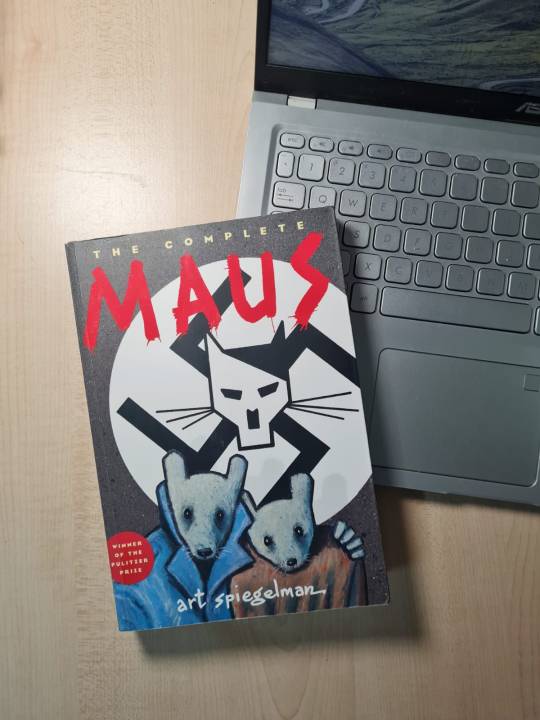
Hi! I read this graphic novel as a part of my english course and ended up reading its second half in the same sitting. Needless to say, I definitely recommend this to you.
Maus (Maus I and II), is a graphic novel in a comic strip format detailing Vladek Spiegelman, a Jewish survivor of the Holocaust’s accounts of Hitler’s Europe and living through it. It also details the lives of Art Spiegelman, his son, as he deals with the guilt of being a second-generation survivor and not actually living through the horrors his parents had to endure.
The Plot
The Pulitzer Prize-winning Maus tells the story of Vladek Spiegelman, a Jewish survivor of Hitler’s Europe, and his son, a cartoonist coming to terms with his father’s story. Maus approaches the unspeakable through the diminutive. Its form, the cartoon (the Nazis are cats, the Jews mice, the Poles as pigs, and Americans as dogs), shocks us out of any lingering sense of familiarity and succeeds in “drawing us closer to the bleak heart of the Holocaust” (The New York Times).
Maus is a haunting tale within a tale. Vladek’s harrowing story of survival is woven into the author’s account of his tortured relationship with his aging father. Against the backdrop of guilt brought by survival, they stage a normal life of small arguments and unhappy visits. This astonishing retelling of our century’s grisliest news is a story of survival, not only of Vladek but of the children who survive even the survivors. Maus studies the bloody pawprints of history and tracks its meaning for all of us.
Why you should read it
Let’s start with the format. The events seesaw with one side being Art, the son, talking to Vladek, his father, as Vladek accounts his life as in that time, and the other side Vladek’s life as he did his best to keep him and his wife alive. The formatting does not take away the truth and seriousness of the Holocaust, but it does balance it out with some much-needed lighter conversations where survival is not the only motive.
Its accounts of the Holocaust. This read depicts the Jews as mice and the Germans as cats (there are a thousand allegories you can take from that one), the Americans as dogs, and Poles as pigs. But despite this representation, it does not have any humour per say. It is a very much matter-of-fact recounting of starvation, survival, violence, and plain suffering.
The depictions of the Jews, especially Vladek and his family. Art’s parents, Vladek and Anja Spiegelman, were two Jews from Poland who survived through the Nazi ghetto of Sosnowiec and the extermination camp of Auschwitz-Birkenau. They were survivors and they bargained and used up favours in order to do this. Vladek saw the gas chambers used to exterminate Jews (like vermin, like mice, you can’t help but read into that one).
Vladek was portrayed as a very flawed man, whose flaws did not disappear with what he lived through and I loved his portrayal. He was not painted as a victim who gave into the sufferings of Jews, or a survivor who was a beloved hero or anything like that. He was a flawed person who ate snow for days to survive and more, and I loved that.
Art and Vladek’s relationship. I loved that this book delves into Art’s guilt of not living through all his parents survived, and his feelings of competing with his (dead) older brother. It makes Maus a very holistic representation of not only the Holocaust and Hitler’s Europe, but also the years long after that and the effects that proved to be lasting through generations.
Its important to know that, as talked about in the book, this book is based closely on the author, Art Spiegelman’s father’s memories of the death camps and Hitler’s Europe, hours on hours of research and took a total of whopping 13 years to complete.
All in all, I recommend you to pick this up, regardless of how old you are!
purchase this book here: https://amzn.to/45UuqZF [this is an associate link]
“Yes, life always takes the side of life, and somehow the victims are blamed. But it wasn’t the best people who survived, nor did the best ones die. It was random!”
View On WordPress
#book recommendations#book review#book reviews#memoirs#must read#non-fiction books#reading#maus#art spiegelman
1 note
·
View note
Text
The Sheik: Part 2
Disclaimer: I don’t own Maus or any of Spiegelman’s work. I have attached the photos from the work itself, but do not claim to own the scanned version either. I highly recommend purchasing the book to support the original author. My thoughts do not represent the author's work and are merely my own interpretations.
Warning: MAUS is a graphic novel based on the author’s father’s experiences during the holocaust and includes anecdotes and scenes including violence, blood which may be considered triggering.
Introduction: The work MAUS by Art Spiegelman is a novel that tells the story of Vladek Spiegelman and his experiences during the holocaust using an allegory and parallel storylines to depict the Vladek's past and Artie's present as he hears the story from his father. This work includes an autobiographical and biographical element due to the inclusion of two main characters - Vladek and Artie. Spiegelman makes the decision to introduce himself as a character in the work as a mouthpiece for himself.
Main Characters:
Artie: The author
Vladek: Artie's father
Anja: Artie's mother
Mala: Vladek's second wife
Françoise: Artie's wife
Navigation ->The Sheik Masterlist-> Previous Part
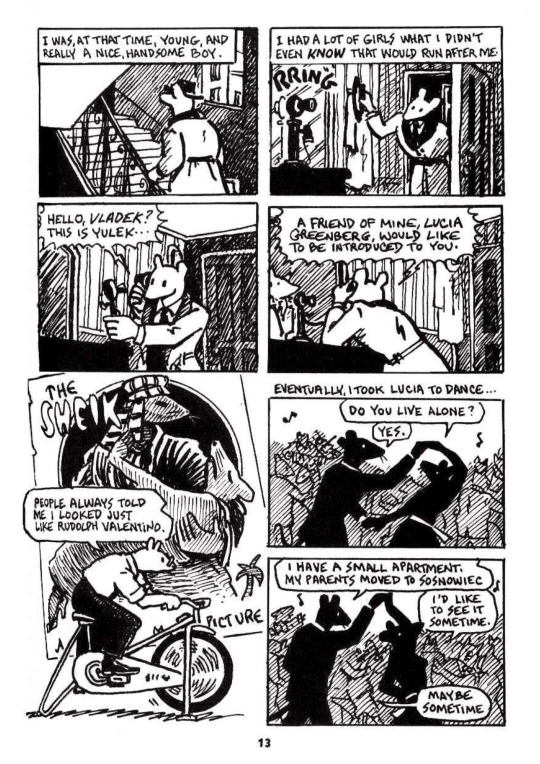
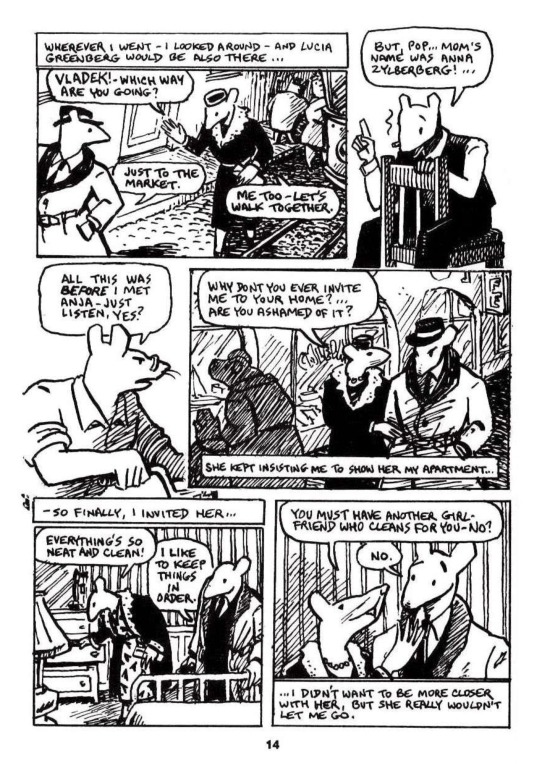
MAUS by Art Spiegelman

Points of Interest:
Text Bubbles
The text bubble start to change from the beginning of the past and Spiegelman uses sharper boxes to imitate the scratchiness of voices over the telephones of that time. His methods of communicating different ideas change with the progression of the work and so does the shape of the speech bubbles, the fonts and the such change.
Representation of the present
While previously the present was depicted in panels, while retelling the past, Spiegelman makes the decision to inform the readers of the events in the present by depicting out of the panels. They as such interrupt the story and shift the focus back to real time and keep reminding the audience of the events of the present, and details of the future.
Change in narrator
The narration has been featured by using squares above panels begin to use first person, establishing that Vladek is speaking and taking the over the role of the narrator while the immersed in the past. This highlights his control over the narrative and the perspective in the past while Artie maintains his authority in the present.
Callback to the Index Card
The dance scene between Vladek and Lucia seems to mirror the Index Card and is evident and seems purposeful as he depicts an intimacy both the readers and him thought was reserved to Anja with Lucia. This hints to a sense of betrayal, by choosing a similar form of portrayal of closeness. Spiegelman could have done this on purpose, or it may simply be coincidence however he does seem to hint at his purpose by using silhouettes in both illustrations.
The Sheik
While previously discussed during the chapter title card, Spiegelman makes a reference and explains the name of the chapter. However the image he presents of Vladek, and the movie poster of the Sheik contrasts and clashes to make discordant picture. Vladek's unfit, and aged body does not match the stature and glory of Rudolph Valentino, the sex symbol of the 1920s. The stationary cycle suggests Vladek is stuck in the past despite going through the motions of displacement by pedalling.
To learn more about the sheik click here.
To learn more about Rudolph Valentino click here.
Stalkerish Tendencies
Lucia is seen to present many creepy characteristics when coupled with Vladek's attitude and it makes her appear as a stalker. However, the narration alone does not present her as such and this would appear normal under more reciprocated circumstances. This means Spiegelman had drawn in situations that may not be true as fillers to depict the past. The interest in visiting Vladek's house shows a closeness, but Vladek's narration makes him appear more reluctant like the drawings. This can be seen through the hands and the upward tilt of her face of the last panel of page 14. Spiegelman depicts her forwardness, and makes her appear more amorous as a result.
Non-Commital Monosyllabic Responses
Vladek's disinterest in pursuing a relationship with Lucia is shown through his distant body language and monosyllabic responses. He uses the least amount of words at each point of conversation making it more significant in the long run of their relationship. The indifference towards her flirtations is shown through his narration but Spiegelman counters this by deeply exaggerating how detached and distant he was throughout their relationship. He does this to tell the readers that while Vladek does display his complete devotion to Anja, his 4 year relationship with Lucia was not sustained on her affection alone.

Next Part
#maus#musings-of-a-lit-student#art spiegelman#literature#analysis#writing#long post#antisemitism#holocaust#graphic novel#comics#art#illustration#books and literature#book recommendations#novel#thoughts#reading#english literature#academia#dark academia#light academia#book bans#ban#banned books#education#trending#spilled thoughts#books
3 notes
·
View notes
Text
PDF/Ebook Maus: A Survivor's Tale: My Father Bleeds History (Maus, #1) BY : Art Spiegelman
(PDF Download) Maus: A Survivor's Tale: My Father Bleeds History (Maus, #1) By Art Spiegelman

Ebook PDF Maus: A Survivor's Tale: My Father Bleeds History (Maus, #1) | EBOOK ONLINE DOWNLOAD
If you want to download free Ebook, you are in the right place to download Ebook. Ebook/PDF Maus: A Survivor's Tale: My Father Bleeds History (Maus, #1) DOWNLOAD in English is available for free here, Click on the download LINK below to download Ebook After You 2020 PDF Download in English by Jojo Moyes (Author).
Download Link : [Downlload Now] Maus: A Survivor's Tale: My Father Bleeds History (Maus, #1)
Read More : [Read Now] Maus: A Survivor's Tale: My Father Bleeds History (Maus, #1)
Description
Maus is the story of Vladek Spiegelman, a Jewish survivor of Hitler's Europe, and his son, a cartoonist who tries to come to terms with his father, his father's terrifying story, and History itself. Its form, the cartoon, succeeds perfectly in shocking us out of any lingering sense of familiarity with the events described, approaching, as it does, the unspeakable through the diminutive. It is, as the New York Times Book Review has commented, "a remarkable feat of documentary detail and novelistic vividness...an unfolding literary event."Moving back and forth from Poland to Rego Park, New York, Maus tells two powerful stories: the first is Spiegelman's father's account of how he and his wife survived Hitler's Europe, a harrowing tale filled with countless brushes with death, improbable escapes, and the terror of confinement and betrayal. The second is the author's tortured relationship with his aging father as they try to lead a normal life of minor arguments and passing visits
0 notes
Photo


Title: Maus
Author: Art Spiegelman
Series or standalone: series
Publication year: 1980
Genres: nonfiction, graphic novel, comics, history, biography, memoir, classics
Blurb: Pulitzer-Prize-winning book Maus tells the story of Vladek Spiegelman, a Jewish survivor of Hitler’s Europe, and his son, a cartoonist coming to terms with his father’s story. Maus approaches the unspeakable through the diminutive. Its form, the cartoon (the Nazis are cats, the Jews mice), shocks us out of any lingering sense of familiarity and succeeds in drawing us closer to the bleak heart of the Holocaust. Maus is a haunting tale within a tale. Vladek’s harrowing story of survival is woven into the author’s account of his tortured relationship with his ageing father. Against the backdrop of guilt brought by survival, they stage a normal life of small arguments and unhappy visits. This astonishing retelling of our century’s grisliest news is a story of survival - not only of Vladek, but of the children who survive even the survivors. Maus studies the bloody paw prints of history and tracks its meaning for all of us.
#maus#my father bleeds history#and here my troubles began#maus a survivor's tale#art spiegelman#series#1980#nonfiction#graphic novel#comics#history#biography#memoir#classics
1 note
·
View note